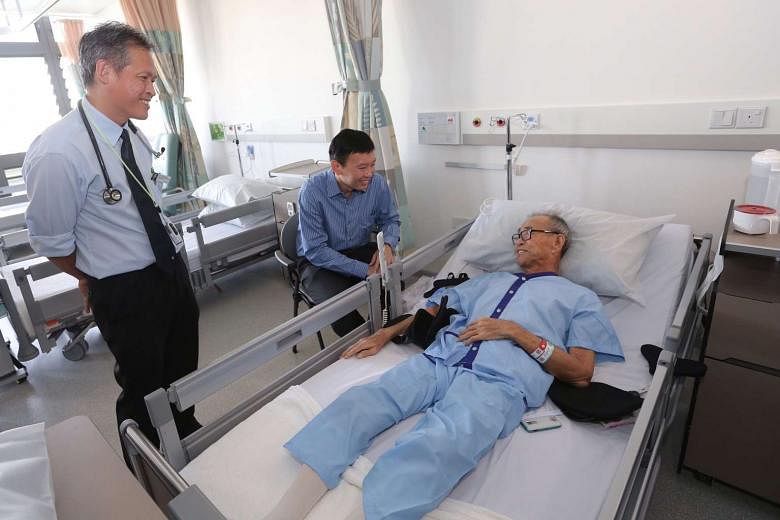SINGAPORE - A task force set up by the Ministry of Health (MOH) earlier this month has identified four ways to help healthcare institutions better respond to unusual infections, such as the hepatitis C outbreak that happened at the Singapore General Hospital (SGH) earlier this year.
The four ways are: reviewing standard operating procedures, making better use of technology, re-looking the list of notifiable diseases under the Infectious Diseases Act, and examining measures to strengthen capabilities to respond to outbreaks in Singapore.
One idea is to set up a national-level "Swat team" of infectious diseases experts who can be mobilised at short notice, Minister of State for Health Chee Hong Tat said on Monday (Dec 28).
Mr Chee, chairman of the task force, gave this update on the group's preliminary findings at the launch of a SG50 event on how Singapore has overcome various infectious diseases over the years.
The task force, set up in early December 2015 to look into the processes for handling infectious disease outbreaks, was convened in the aftermath of the hepatitis C outbreak at SGH between April and June 2015.
To date, 25 patients who were warded at SGH have been diagnosed with the same family of hepatitis C virus. Eight patients have died, with five deaths possibly linked to the virus.
An independent review committee (IRC) found that while there were solid reporting procedures in place for well-known infectious diseases and epidemics, these were not effective in catching an "unusual and unfamiliar" outbreak like the hepatitis C infections.
Mr Chee said: "The recent hepatitis C outbreak in SGH is a painful lesson that we must learn from and take concrete steps to improve. The task force, which I am leading, aims to strengthen detection and response to outbreaks in both healthcare institutions and the wider community.
"As the IRC had highlighted in its report, we have robust systems and processes for handling community infections such as dengue, avian flu and Mers. These are diseases which have higher risks of spreading in the community, so it is correct that they are given higher priority."
He added: "The IRC pointed out that our current systems and processes are not as well-developed to detect and respond to unusual infections. This is a gap which we will address."
On reviewing standard operating procedures, or SOP, Mr Chee said the IRC had found that healthcare institutions in Singapore already have good infection control protocols in place.
So the way forward is not in adding more rules and procedures, he added, but balancing key operations and patient care with the need to keep SOPs simple, and helping medical professionals focus on their core responsibilities and to comply with existing infection control protocols.
Secondly, the task force plans to make better use of data analytics and information technology (IT) systems to improve the detection of potential outbreaks.
"Our current system depends too heavily on human judgment to process large amounts of information and decide whether the risks are significant enough for escalation and further investigation," said Mr Chee, who is also Minister of State for Communications and Information.
"While professional judgment remains central to outbreak detection and response, this should be supplemented with IT systems and data analytics to facilitate reporting, enhance the recognition of patterns and improve the detection of weak signals."
Thirdly, Mr Chee said, the task force will be re-looking the list of notifiable diseases under the Infectious Diseases Act and also look at the modes of notification, timelines and escalation process.
Currently, most measures to prevent and control infectious diseases in Singapore come under the Infectious Diseases Act, including hepatitis C. The Act includes provisions for the director of medical services of MOH to get patient information from doctors to investigate an outbreak, and to fine or jail those who lie about donating infected blood, for example.
"The task force will be careful about the downsides of adding more reporting and administrative burden for our healthcare institutions and medical professionals. What we want is to encourage and enable medical professionals to report cases which they come across by providing clearer guidelines and simplifying the reporting process where possible, for example by having a direct link from the laboratory to MOH on positive cases," Mr Chee said.
Lastly, the task force will also examine measures to strengthen capabilities to respond to outbreaks in Singapore.
While it is not feasible for every healthcare facility to develop its own full-fledged infection control response team which is capable of responding to complex and unusual outbreaks, he said the task force is studying if it can set up a national-level "Swat team" of infectious diseases experts.
These will be people who can be mobilised at short notice to respond to outbreaks in any healthcare institution. This team could comprise members who come from different institutions in Singapore, including hospitals, universities and government agencies.
Mr Chee said: "The task force has just started work and we are at an early stage of our deliberations and review. I have shared with you some of the initial thinking, and would welcome feedback and suggestions to help us refine our proposals.
"Together with the medical and nursing fraternity, my task force members and I are determined to improve patient safety by enhancing our systems and processes, and strengthening the detection and response to unusual infectious outbreaks.
"We need your support to achieve these objectives."


